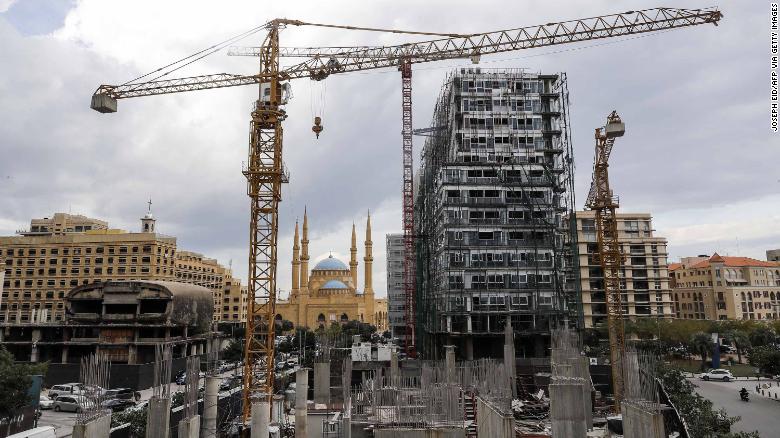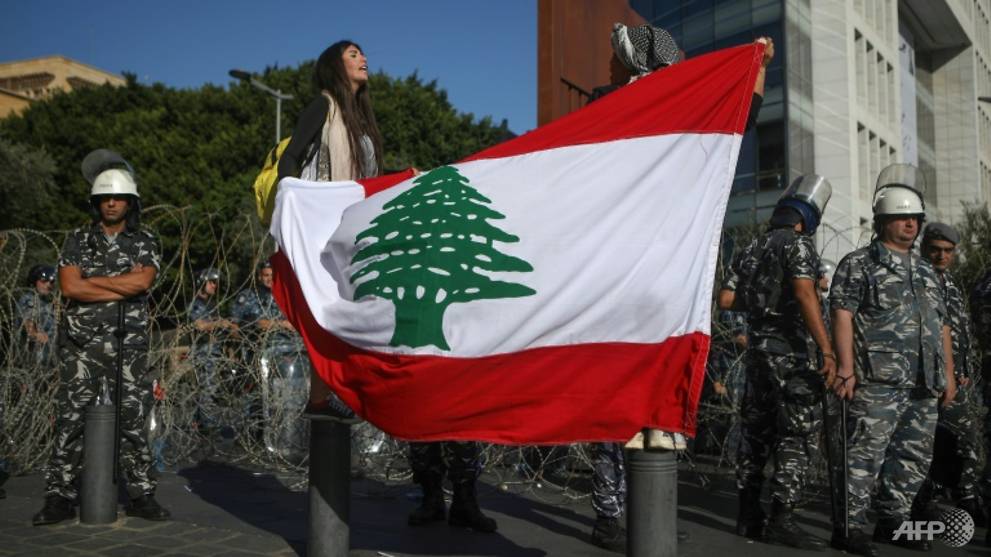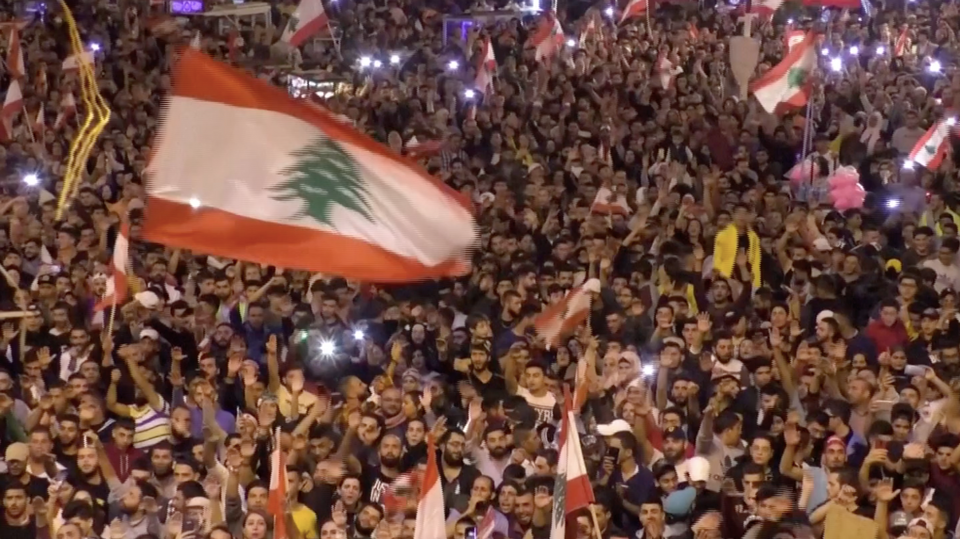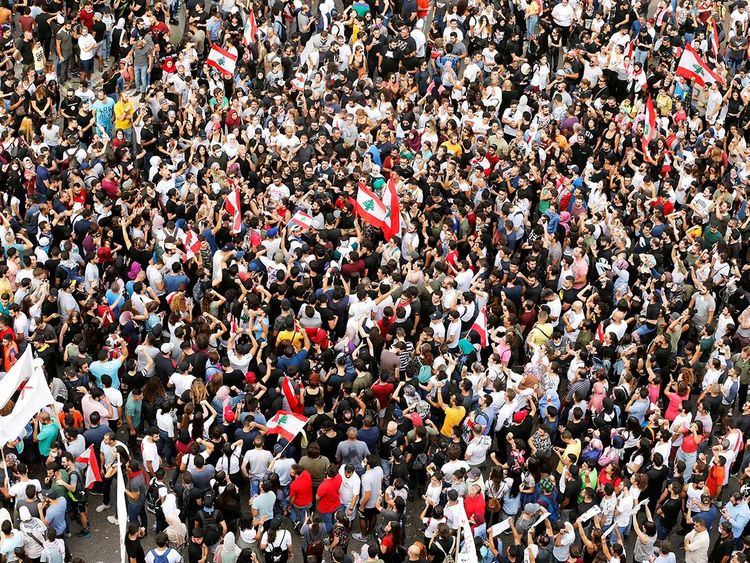New York (CNN Business) By Paul R. La Monica— Jeff Bezos and Bill Gates can clearly afford a lot of leather wallets from Louis Vuitton and little blue boxes from Tiffany. But the world’s two richest people could soon find themselves worth less than the head of LVMH because of its takeover of Tiffany. Bernard Arnault, chairman […]
By Reuters — BEIRUT– Clashes broke out between anti-government demonstrators and supporters of the Shi’ite movements Hezbollah and Amal in the Lebanese capital, Beirut, early on Monday, live footage on Lebanese television channels showed, as tensions escalated when demonstrators blocked a main bridge downtown. Protesters initially began to scuffle and their numbers quickly rose, footage […]

by Dana Halawi BEIRUT — (Xinhua) — Lebanese traders are experiencing the worst time ever with around 20 percent of them expected to be out of business by the year end amid the U.S dollar crisis in the market and the nationwide protests that have paralyzed the country for more than a month. “The trade sector is expected to witness the closure of around 20 percent of retail companies and the layoff of around 150,000 to 200,000 employees while others will be paid half of their salaries,” Adnan Rammal, representative of the trade sector in the Economic and Social Council, told Xinhua. Rammal said the trade sector has been suffering since before the beginning of protests when banks resorted to higher interest rates to attract depositors, which, in turn, led to increased costs for bank’s borrowers. “As a result, a lot of retailers suffered from staying in business because their work depends highly on loans from banks,” he explained, adding protests have put an additional burden on the sector.
Protests caused a 60-percent drop in trade activity in Lebanon because people fear to spend their money on items other than food, said Rammal. Meanwhile, banks imposed harsh restrictions on the transfer of U.S. dollars by traders who import from outside Lebanon. “This has impacted business owners who ran out of products and hence saw a drop in their sales activity while employees can’t get fully paid under such circumstances,” the Lebanese official said. Lebanon has witnessed in the past few months a shortage in U.S. dollar because of the economic slowdown and the drop in cash injections from the Lebanese abroad, thus reducing the central bank’s foreign currency reserves. The demand for dollar has created a parallel market in which one dollar is selling at up to 1,900 Lebanese pounds, much higher than the official exchange rate of 1,515 pounds. Merchants interviewed by Xinhua reported a steep decline in their sales with some of them being unable to cover their expenses.
Fouad Rizk, a shoe store owner in Beirut, said he has not been able to sell at all since the start of the protests because his business depends mainly on tourists who have been absent in the past couple of months. Rizk added that he did not import any new items for this new season because he cannot obtain enough U.S. dollars to pay for his imports. Abed, who owned a clothing shop in the capital, said he couldn’t sell even one piece of clothing now. “Even if we sell any of our items, we will lose because we pay for our imports in U.S. dollars and clients pay in Lebanese pounds which now only worth almost 30 percent of its previous value,” he noted. According to Rammal, around one third of the Lebanese work in the private sector while 250,000 people make their living out of trade business. “This is why there should be a strong cooperation between banks and merchants to avoid the social repercussions of laying off thousands of employees who have responsibilities to fulfil including their children’s school fees and loans,” he said. In an attempt to solve part of the problems facing traders of basic commodities such as fuel, medicine and wheat, Lebanon’s Central Bank issued a circular to secure dollars for Lebanese banks at the official fixed exchange rate to allow the import of these items.

by hbr.org — Jon M. Jachimowicz —It seems like we’re constantly told to pursue work that we’re passionate about. At least in the United States, this advice follows people from school and into their careers. As billionaire investor Ray Dalio advises in his book Principles, “make your passion and your work the same thing.” Doing so is said to be the path to success. This is perhaps why a recent study found that young people rank achieving their career passion as their highest priority — above making money or getting married. Finding a fulfilling job was deemed nearly three times more important than having a family by the teenage respondents. But, for many people, this simply isn’t feasible. Not every job affords the possibility of pursuing a passion. And most people care deeply about many different things — not all of which will be how they want to earn a living. A growing body of research suggests that pursuing your passion does indeed improve your well-being but that where you do it is far less critical. In fact, several studies show that doing something you are passionate about outside of work rather than in it benefits both your career and your personal life.
Why we should pursue passion outside of work
While pursuing passion at work is known to increase work engagement and job performance, it’s both unrealistic and risky to rely on work as the only means through which to do so. Some jobs don’t allow employees to focus on their interests, and the jobs that do aren’t always financially viable. In some regards, following and finding passion at work could be seen as a luxury for the privileged few — those who can afford to choose exactly the right professions. Tying work to what you are passionate about can also be harmful over the long-term. When you stake your whole self-worth on your job, you become less resilient to adverse events, such as layoffs or negative performance reviews. It can also make it harder to switch off after working hours and get the respite necessary to regain energy for the next day. Plus, it deprives us of the many benefits that come with engaging in outside activities and hobbies — for example, stress reduction, higher energy, and increased levels of creativity, all of which may boost work engagement and retention. One recent study even showed that people accrued greater benefits when their personal passions and their actual work were very different. It’s important to realize that the desire to pursue passion at work is a modern phenomenon — and one relatively unique to the United States. In other countries, particularly European ones, people more commonly find fulfillment outside of work. For example, nearly half of Germans are members of at least one after-work club, which allows them to engage in favorite activities such as sports or gardening in their personal time. In the U.S., by contrast, only few Americans have hobbies or extracurriculars that they actively pursue.





/https://www.thestar.com/content/dam/thestar/news/world/middleeast/2019/11/22/parallel-national-day-rallies-by-lebanon-protesters-leaders/HAS107-1122_2019_060814.jpg)
BEIRUT (REUTERS) – TENS of thousands of protesters took to the streets in Lebanon on Friday to mark independence day with a fresh wave of demonstrations against a ruling elite accused of rampant corruption and steering the country into deep crisis. The unprecedented wave of nationwide protests erupted five weeks ago, leading to the resignation of Prime Minister Saad al-Hariri on Oct. 29. Despite a worsening economic crisis, deeply divided politicians have yet to agree on a new government.
Protesters waving Lebanese flags packed central Beirut’s Martyrs Square where music blasted into the night. Many protesters said they felt like they were celebrating independence for the first time. “This year independence day is different. Before, they marred it with their system of sharing power and corruption. Today, we are demanding a clean independence and a country where we can live in dignity and pride,” said a protester who gave her name as Hind. “It’s important to show up today of all days and be united as a country. Everyone is realizing what true independence looks like,” said Lydia, 21, who was protesting in Beirut.
A military parade usually held on the seafront near Martyrs Square was relocated to the defense ministry where Hariri, still serving as prime minister in a caretaker capacity since his resignation, attended a low-key ceremony with President Michel Aoun and Parliament Speaker Nabih Berri. Hariri, who is aligned with Western and Gulf Arab states, is at odds with Aoun, Berri and the powerful Shi’ite group Hezbollah over the make-up of the next government. Broadcaster al-Jadeed noted an “unusual” silence between Hariri and Berri while other members of the government chatted to each other. Lebanon is facing its worst economic crisis since the 1975-90 civil war, rooted in years of state corruption and waste. The crisis has spread to the financial system where the pegged Lebanese pound has weakened, dollars have become scarce and banks have imposed controls to prevent capital flight. Aoun, in a televised speech marking independence day on Thursday, said it was “not the time for speeches, words and celebrations”. “It is time for work, serious and diligent work because we are in a race against time.” (Reporting by Dala Osseiran and Nadine Awadalla; Editing by Tom Perry and Peter Graff) Copyright 2019 Thomson Reuters.
Lebanese hold 1st “civil parade” to celebrate Independence Day

By MATTHEW LEE AP Diplomatic Writer WASHINGTON (AP) – The Trump administration is withholding more than $100 million in U.S. military assistance to Lebanon that has been approved by Congress and is favored by his national security team, an assertion of executive control of foreign aid that is similar to the delay in support for Ukraine at the center of the impeachment inquiry. Secretary of State Mike Pompeo on Friday congratulated Lebanon as the country marked its independence day but made no mention of the hold-up in aid that State Department and Pentagon officials have complained about for weeks.
It came up in impeachment testimony by David Hale, the No. 3 official in the State Department, according to the transcript of the closed-door hearing released this week. He described growing consternation among diplomats as the administration would neither release the aid nor provide an explanation for the hold. “People started asking: What’s the problem?” Hale told the impeachment investigators. The White House and the Office of Management and Budget have declined to comment on the matter. The $105 million in Foreign Military Funding for the Lebanese Armed Forces has languished for months, awaiting approval from the Office of Management and Budget despite congressional approval, an early September notification to lawmakers that it would be spent and overwhelming support for it from the Pentagon, State Department and National Security Council.
As with the Ukraine assistance, OMB has not explained the reason for the delay. However, unlike Ukraine, there is no suggestion that President Donald Trump is seeking “a favor” from Lebanon to release it, according to five officials familiar with the matter. The mystery has only added to the consternation of the national security community, which believes the assistance that pays for American-made military equipment for the Lebanese army is essential, particularly as Lebanon reels in financial chaos and mass protests. The aid is important to counter Iran’s influence in Iran, which is highlighted by the presence of the Iranian-supported Shiite Hezbollah movement in the government and the group’s militias, the officials said. There is opposition to aid to the Lebanese army from outside the NSC. Pro-Israel hawks in Congress have long sought to de-fund the Lebanese military, arguing that it has been compromised by Hezbollah, which the U.S. designates as a “foreign terrorist organization.” But the Pentagon and State Department reject that view, saying the army is the only independent Lebanese institution capable of resisting Hezbollah. Outside experts agree.
BEIRUT (AP) — A Lebanese soldier who shot and killed a protester in Beirut last week was charged Thursday by a military prosecutor with murder, state-run National News Agency said. The agency said a colonel who was on the scene with the soldier at the time was also charged. The soldier could get a death […]

by Alice Hackman| Agence France Presse — BEIRUT: At an anti-corruption rally in Lebanon’s capital, 16-year-old Mariam Sidani said she had skipped school to protest against politicians who care nothing for her life prospects. “No one’s taking care of my future,” she said, her face flushed after a day in the sun. “I want to live in my own country, not be forced abroad,” she said, her long hazel hair flowing over her backpack straps. At the heart of Lebanon’s 1-month-old protests, a young generation of activists is coming of age and demanding a country in which they can see themselves thriving and growing old.
With humorous songs, satirical art and creative slogans, they are demanding the overhaul of an entire political class they see as inefficient, corrupt and out of touch. Many of the protesters were born in 2000 or later, learning online what life is like overseas, and they say what is on offer in Lebanon is simply not good enough. “All over the world students are fighting for climate justice,” Sidani said. “But we don’t even have a sea,” she said of a polluted coastline that is largely privatized and to which access is prohibitively expensive. ‘Worse than season 8’Near the seat of Cabinet, students dance to the booming beat of a rapper from the northern Akkar region demanding “the fall of the regime.” A young female university student holds up a poster depicting top politicians as sharks. “Let’s go hunt,” it reads.
Another student deplores the country’s endless political crises and crumbling economy with a pop culture reference. “It’s so bad you made me forget how bad season 8 was,” her poster says, referring to TV series Games of Thrones. Like their older counterparts, Lebanon’s Generation Z demand 24-hour electricity, clean water, healthcare, better garbage management, more public spaces and an end to corruption. But in a country where more than 30 percent of youth are unemployed, they also just want jobs. Tina, a high school student, said she wanted a future not defined by the ability to pay bribes or call in a favor from someone influential. “We want to stay here with our families and find jobs without personal connections,” she said, clutching a cardboard poster that denounced parents who effectively buy their children good marks in school. Not far off, dancing among the crowd, 19-year-old Sandra Rizk had flown back to Lebanon from her first year at university in Italy to take part in the protests. “We have really intelligent people who are leaving this country to go and fix other ones. It shouldn’t be like this,” she said. “Those people have to come back and repair Lebanon,” said the fashion design student, short curly brown hair framing her face. ‘Social justice’Analyst Nadim Houry said the new generation of demonstrators had surprised people. “Everyone expected them to be too lethargic from all these hours on YouTube and social media,” said the executive director of the Arab Reform Initiative. “But similar to their cohort in places as far as Hong Kong, they have shown themselves to be more political and articulate than their predecessors,” he told AFP.

Nadine Awadalla, Eric Knecht — BEIRUT (Reuters) – Protesters prevented Lebanon’s parliament from holding its first session in two months on Tuesday, escalating a wave of demonstrations against rulers blamed for steering the country towards economic collapse. Banks reopened after a one-week closure, with police stationed at branches and banks applying restrictions on hard currency withdrawals and transfers abroad. The protests erupted last month, fuelled by corruption among the sectarian politicians who have governed Lebanon for decades. Protesters want to see the entire ruling class gone from power.
Lebanon’s economic troubles have increased since then. Despite the depth of the economic crisis, the worst since the 1975-90 civil war, politicians have been unable to form a new government since Prime Minister Saad al-Hariri quit on Oct. 29. Near parliament on Tuesday, gunfire was heard as several dozen protesters forced two SUVs with official plates and tinted windows to turn back as they approached the building, Lebanese television showed. The vehicles sped away after they were struck by demonstrators chanting “Out, out, out!”
Parliament postponed the session indefinitely. “This is a new victory for the revolution and we are continuing until we achieve our goals,” said protester Abdelrazek Hamoud. The session’s agenda had included reelecting members of parliamentary committees and discussion of an amnesty law that would lead to the release of hundreds of prisoners. Protesters were angry the MPs were not tackling their demands for reform. Security forces had fanned out before dawn, shutting down roads around parliament with barbed wire. Police scuffled with protesters who tried to remove a barbed wire barricade. A protester waves a Lebanese flag next to a bonfire during ongoing anti-government protests in Beirut, Lebanon November 19, 2019. REUTERS/Andres Martinez Casares Ahmad Mekdash, a civil engineer, said: “They should be meeting right now to form a new cabinet and not to pass laws, especially laws that aren’t urgent.”

By BASSEM MROUE and MARIAM FAM — BEIRUT (AP) — Young men chanting the “people want to bring down the regime” gathered outside the office of Lebanese legislator Mohammed Raad, the powerful head of Hezbollah’s parliamentary bloc. One shirtless man grabbed a metal rod and swung it at the sign bearing Raad’s name, knocking it out of place as others cheered. It was a rare scene in the southern market town of Nabatiyeh, a Hezbollah stronghold. The protests engulfing Lebanon have united many across sectarian lines and shattered taboos, with some taking aim at leaders from their own sects, illustrating a new, unfamiliar challenge posed to the militant group.
Iranian-backed Hezbollah built a reputation among supporters as a champion of the poor and a defender of Lebanon against Israel’s much more powerful military. It and its Shiite ally, the Amal party, have enjoyed overwhelming backing among the Shiite community since the end of the 1975-1990 civil war, making them a political powerhouse that, along with allies, has dominated recent governments. But now many protesters group Hezbollah into the ruling class they are revolting against, blaming it for wrecking the economy with years of corruption and mismanagement. Protesters want that entire political elite out. Hezbollah’s leader, Hassan Nasrallah, and Amal’s chief, Parliament Speaker Nabih Berri, have not been spared. “All of them means all of them, and Nasrallah is one of them,” protesters have chanted at some Beirut rallies. The demonstrations that erupted Oct. 17 spread throughout the country, including predominantly Shiite areas in the south and the eastern Bekaa Valley. “The heavy participation of the Shiites … posed a main challenge: that there’s a large number from the sect that doesn’t accept the current situation,” said Hilal Khashan, professor of political science at the American University of Beirut. “That’s why there was a swift and decisive decision to nip this in the bud.” In several instances, men suspected of being Hezbollah and Amal supporters beat up protesters and destroyed their tents. Some of those who had criticized Nasrallah and Berri on social media appeared in videos, after apparently being beaten, to apologize for what they did. Amal denied any link to those behind the beatings, saying in a statement that they should be arrested and that they violated the movement’s belief in freedom of opinion. Hezbollah has survived many threats over the past years, including charges by a U.N.-backed tribunal for the killing of former Prime Minister Rafik Hariri in February 2005 — an accusation Hezbollah strongly denies — a ruinous war with Israel in 2006 and the war in neighboring Syria, where Hezbollah has sent thousands of fighters to back President Bashar Assad, losing an estimated 2,000 men.



